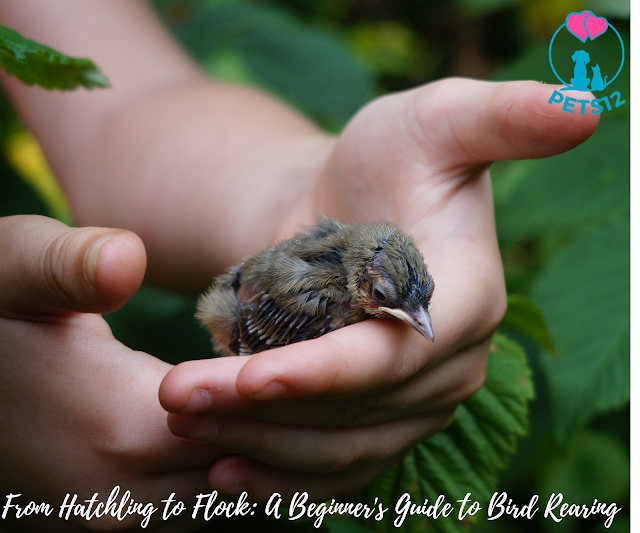From Hatchling to Flock: A Beginner's Guide to Bird Rearing
Bird breeding basics
When it comes to bird rearing, starting from scratch can be quite an exciting journey. From the initial steps of selecting the right bird species to the joys of witnessing birds grow and thrive, bird breeding can be a rewarding experience for both amateurs and experts alike. In this guide, we will walk you through the basics of bird rearing, providing you with valuable insights and tips to help you kickstart your own flock.
Bird care for amateurs
Before diving into the world of bird breeding, it's essential to understand the fundamental aspects of bird care. As a beginner, you need to familiarize yourself with the necessary provisions to ensure the well-being and happiness of your feathered friends. From creating a suitable living environment to providing a balanced diet, let's explore the essential elements of bird care.
Selecting the right bird species
Choosing the right bird species is the first step in your bird rearing journey. Consider your interests, available space, and the level of commitment you are willing to devote to bird breeding. Some species, such as canaries or budgerigars, are renowned for their vibrant colors and melodic songs, making them popular choices among beginners. Others, like finches or lovebirds, thrive in social environments and require companionship.
Creating a comfortable living environment
Providing a suitable habitat is crucial for the well-being of your birds. Depending on the species you choose, you may need to invest in an appropriately-sized cage or an aviary. Ensure that the enclosure allows ample space for your birds to move around, stretch their wings, and exercise. Additionally, furnish the space with perches, synthetic trees, and a variety of toys to keep your feathered companions mentally stimulated.
Proper nutrition
A balanced diet is essential for your bird's health and vitality. Different bird species have specific dietary requirements, so it's crucial to research and provide the appropriate food. While many commercial bird food options are readily available, it's important to supplement their diet with fresh fruits, vegetables, and occasional treats. Consider consulting with an avian veterinarian or a knowledgeable breeder to ensure you are meeting your bird's nutritional needs.
Maintaining hygiene
Regular cleaning and maintaining proper hygiene is crucial in bird care. Allocate time each day to clean the birdcage or aviary, removing droppings, and refreshing the water and food containers. Additionally, provide your birds with a regular bathing area, such as a shallow dish or a designated bird bath, to help them maintain their plumage in top condition.
Starting a bird flock
Once you have gained confidence in caring for individual birds, you may consider expanding your flock by introducing multiple birds. However, proper planning and preparation are key to successfully integrating new birds into an existing group. Let's explore the steps involved in starting a bird flock.
Understanding social dynamics
Before adding new birds to your flock, it's vital to understand the social nature of different bird species. Some birds are more territorial and may not appreciate the presence of newcomers, while others thrive in a group environment. Research the social tendencies of the species you are considering and ensure that their social needs align with your desire for a bird flock.
Introducing new birds
When introducing new birds to an established flock, it's crucial to do so gradually and under controlled circumstances. Begin by placing the new bird in a separate cage adjacent to the existing flock. This allows the birds to observe and become familiar with each other without direct contact. Over time, you can slowly introduce them by allowing short periods of supervised interaction. Keeping a watchful eye during this process will ensure that the birds acclimate to each other gradually.
Monitoring the flock
Once your bird flock is established, it's essential to monitor their interactions and be vigilant for any signs of aggression or stress. Birds have unique personalities, and conflicts may arise within the flock. Pay attention to any signs of discomfort or bullying and intervene if necessary. Providing plenty of perches and hiding spots can also help alleviate tension within the group.
Seeking professional advice
If you encounter any challenges or concerns while starting or maintaining your bird flock, it's always advisable to seek guidance from experienced bird breeders or avian veterinarians. They can provide valuable insights and offer solutions based on their expertise. Don't hesitate to reach out and ask for assistance when needed.
Embarking on the journey of bird rearing is both exciting and fulfilling. As a beginner, it's important to equip yourself with the necessary knowledge and resources to ensure the well-being of your birds. By understanding the basics of bird breeding, caring for your feathered friends, and gradually expanding your flock, you can cultivate a thriving avian community that brings joy and wonder to your life. Happy bird rearing!

